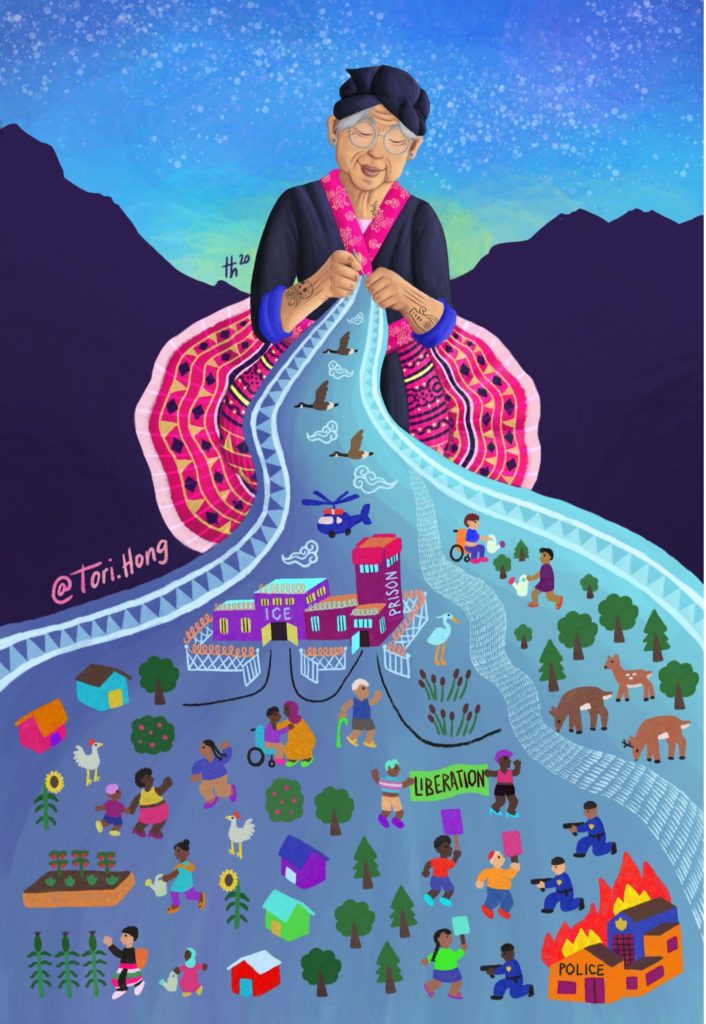
“Abolitionist Elder” by Tori Hong, used with permission
Despite May having been the month to celebrate Asian American and Pacific Islander (AAPI) Heritage, the preceding year saw the increase of violence and hate towards Asians and Asian Americans that ranged from attacks on Asian and Asian American elders and Asian American children being bullied in schools across the nation to, more recently, the March 16 Atlanta shooting. Between March 19, 2020 and March 31, 2021, the organization Stop AAPI Hate received 6,603 reports of anti-AAPI hate incidents, with over 42 percent of the reported hate incidents (2,808) occurring in just the last month of that time. Stop AAPI Hate was formed by the Asian Pacific Planning and Policy Council, Chinese for Affirmative Action, and the Asian American Studies Department of San Francisco State University to track reporting of violence, harassment, discrimination, child bullying, etc. against AAPI people in the United States as a result of the rise in xenophobia and racism towards AAPI people during the COVID-19 pandemic.
According to Stop AAPI Hate’s March, 2021 reporting, the majority of discrimination reports have been verbal harassment (65.2 percent), shunning (18.1 percent) and physical assaults (12.6 percent). National trends show that many of these incidents occur in public spaces like streets and parks (37.8 percent), as well as businesses (32.2 percent). Of the reports thus far, 64.8 percent have been reported by women. Further statistics and information on the rise in anti-Asian violence can be found at the Stop AAPI Hate and other AAPI websites listed below.
These acts of violence have escalated during the pandemic, but anti-Asian hate is not new, especially as a state-sanctioned phenomenon. Xenophobia and racism against, and erasure of, AAPI individuals and communities can be traced back to the 1875 Page Act, which excluded Asian women, who were deemed immoral and diseased sex workers. With the 1882 Chinese Exclusion Act, Congress barred Chinese immigrants from entering the United States and those already here from becoming US citizens. No one can forget the internment of Japanese Americans during World War II, when Japanese Americans were stripped of their rights as American citizens. The US government contributed to the amnesia of Hmong soldiers risking and sacrificing their lives to save American pilots and to guide American soldiers along the Ho Chi Minh Trail during the Vietnam War by subsuming Hmong’s involvement under the term “secret war.”
One hate crime known well in Asian American history is the brutal attack on Vincent Chin on June 19, 1982 in Highland Park, Michigan. On the night of his bachelor party, Vincent was violently beaten with a baseball bat by two white auto workers who had been laid off. They blamed Vincent, who was Chinese American, for the massive US layoffs at a time when the American auto industry was subject to losses due to competition from Japan. This violent beating put Vincent Chin in a coma, and he died four days later. The ensuing trial culminated in the judge’s weak sentence of three years’ probation and a meager fine for this act of hate and violence. This impunity angered many in the Asian American community and sparked community organizing led by journalist and activist Helen Zia, the Chin family, and other Asian American leaders, resulting in the creation of the American Citizens for Justice (ACJ). Along with the collective action of community organizing from religious organizations to Black activists, Asian Americans across the country protested against the judge’s lenient sentencing. As a result, Chin’s case became a federal civil rights case. That trial ended with one man acquitted of all charges and the other, who held the fatal bat, sentenced to 25 years. However, he was eventually acquitted in a second trial and all charges were dropped due to allegations of witness coaching. This was a case that illustrated the injustice of our legal system. Nevertheless, ACJ continues to fight for and to provide legal, social, and economic resources to those experiencing discrimination and to offer advocacy and participation in the political process for immigrants.
These acts of violence and hate have a long history in America; however, we can work to combat and change this history. We must take it upon ourselves to be informed and engaged, and join the call for collective action to end violence against the AAPI community, and, in so doing, also end violence against all communities. Below I offer some resources to this end.
Call to Action
There are many ways for you to work towards ending AAPI hate and violence. Here are a few things you can do:
- Learn about AAPI history.
- Support AAPI organizations that work to end hate and violence in AAPI communities and to support AAPI communities (e.g., volunteer, donate, attend events, etc.).
- Be informed about AAPI issues.
- Be trained in bystander intervention to stop xenophobia and AAPI harassment.
- Listen to and support AAPI family and friends who experience any form of violence and racism.
- Share information about how to report incidents of AAPI hate.
- Call out anti-AAPI violence and racism.
- Be open to learning from and understanding AAPI experiences.
- Continue to build community with AAPI community members.
- Learn about and join the intersectional work of AAPI coalition collectives.
This is not an exhaustive list, but some resources to start building anti-racist education and work towards understanding the intersectionality with diverse communities of the experiences of Asians and Asian Americans.
Asian American Organizations
Anti-AAPI harassment, discrimination, violence, etc. can be reported directly on many organizational websites. Advocacy support can also be found at these websites:
- American Citizens for Justice
- Asian Americans Advancing Justice
- Asian Pacific Policy & Planning Council
- Chinese for Affirmative Action
- Creating Law Enforcement Accountability & Responsibility (CLEAR)
- Council on American Islamic Relations
- Freedom, Inc.
- Sikh American Legal Defense and Education Fund
- Southeast Asia Resource Action Center
- Stop AAPI Hate
Asian American Resources
Documentaries
- Who Killed Vincent Chin? (dir. Christine Choy, 1987)
- Yuri Kochiyama: Passion for Justice (dir. Patricia Saunders and Rea Tajiri, 1993)
- Vincent Who? (dir. Tony Lam, 2009)
- The Grace Lee Project (dir. Grace Lee, 2005)
- Witnesses to a Secret War (dir. Deborah Dickson, 2009)
- American Revolutionary: The Evolution of Grace Lee Boggs (dir. Grace Lee, 2014)
- Asian Americans (PBS, 2020)
- America’s Secret War: Minnesota Remembers Vietnam (American Public Television, 2017; response to the missing story in Ken Burns and Lynn Novick’s The Vietnam War on PBS)
- Cambodian Son (dir. Masahiro Sugano, 2014)
More AAPI films can be found at the website of the Center for Asian American Media (https://caamedia.org/)
Books
- Viet Thanh Nguyen, The Sympathizer
- Paula Yoo, From a Whisper to a Rallying Cry: The Killing of Vincent Chin and the Trial that Galvanized the Asian American Movement
- Ocean Vuong, On Earth We’re Briefly Gorgeous
- Kao Kalia Yang, The Latehomecomer: A Hmong Family Memoir
- Thi Bui, The Best We Could Do
- Mai Der Vang, Afterland
- Cathy Park Hong, Minor Feelings: An Asian American Reckoning
- Helen Zia, Asian American Dreams: The Emergence of an American People
- Kip Fulbeck, Part Asian, 100% Hapa
- Alice Wong, ed., Disability Visibility: First-Person Stories from the Twenty-First Century
- Leah Lakshmi Piepzna-Samarasinha, Care Work: Dreaming Disability Justice
CU–Specific Resources (lectures and events are held by these UIUC centers and departments)
- Department of Asian American Studies
- Asian American Cultural Center
- Japan House
- Asian Educational Media Service
- Center for Advanced Study (initiatives like Abolition)
- Office of Inclusion and Intercultural Relations (We RISE series on Abolition)
Start conversations and take action towards abolition!

May Kao Xiong is currently a Ph.D student at the University of California, Merced, where her research focuses on diversity and the university. She is an alumna of the University of Illinois at Urbana-Champaign, and worked at the Asian American Cultural Center and the College of Education at UIUC from 2007–15.
1,693 total views, 1 views today